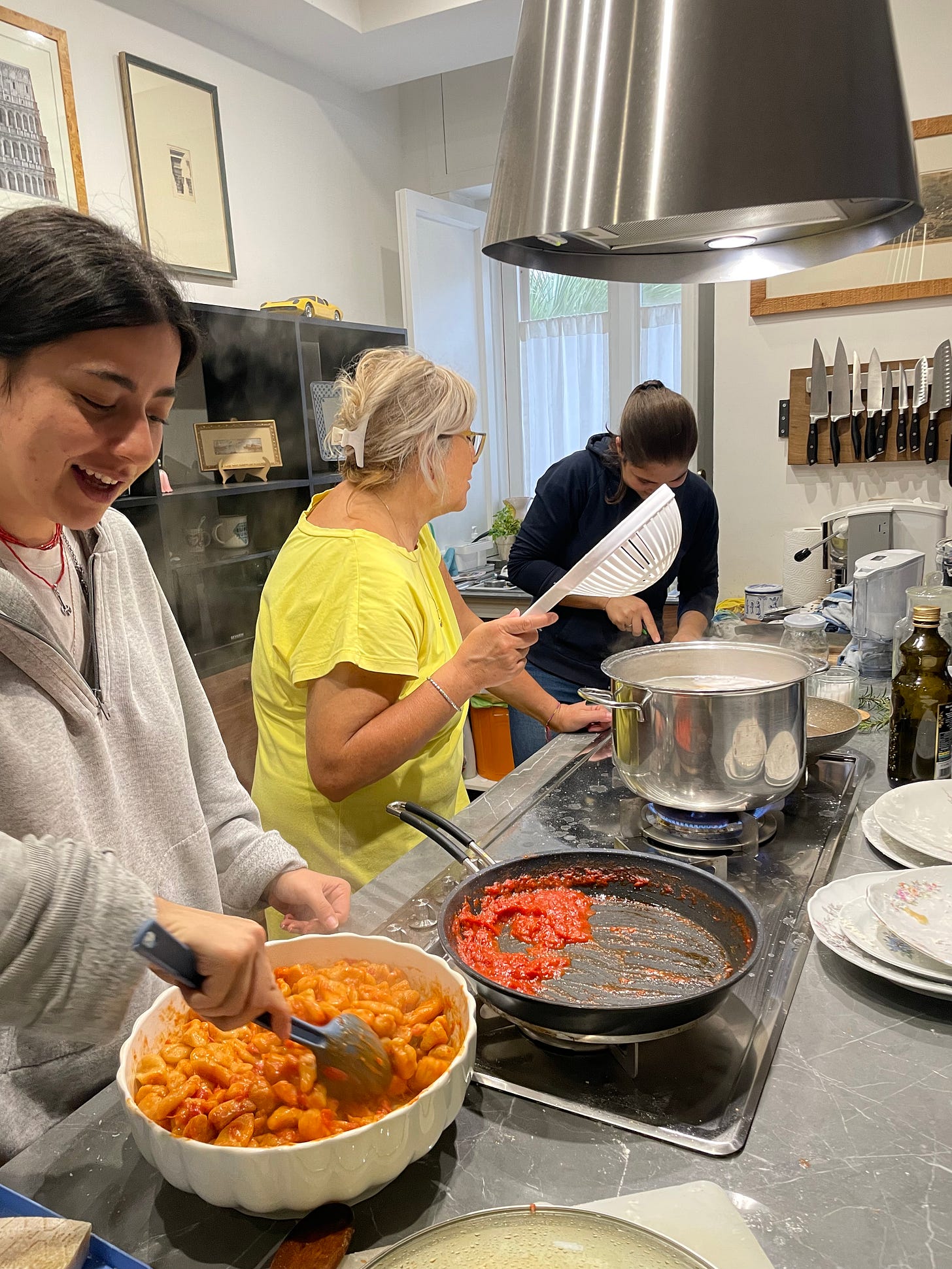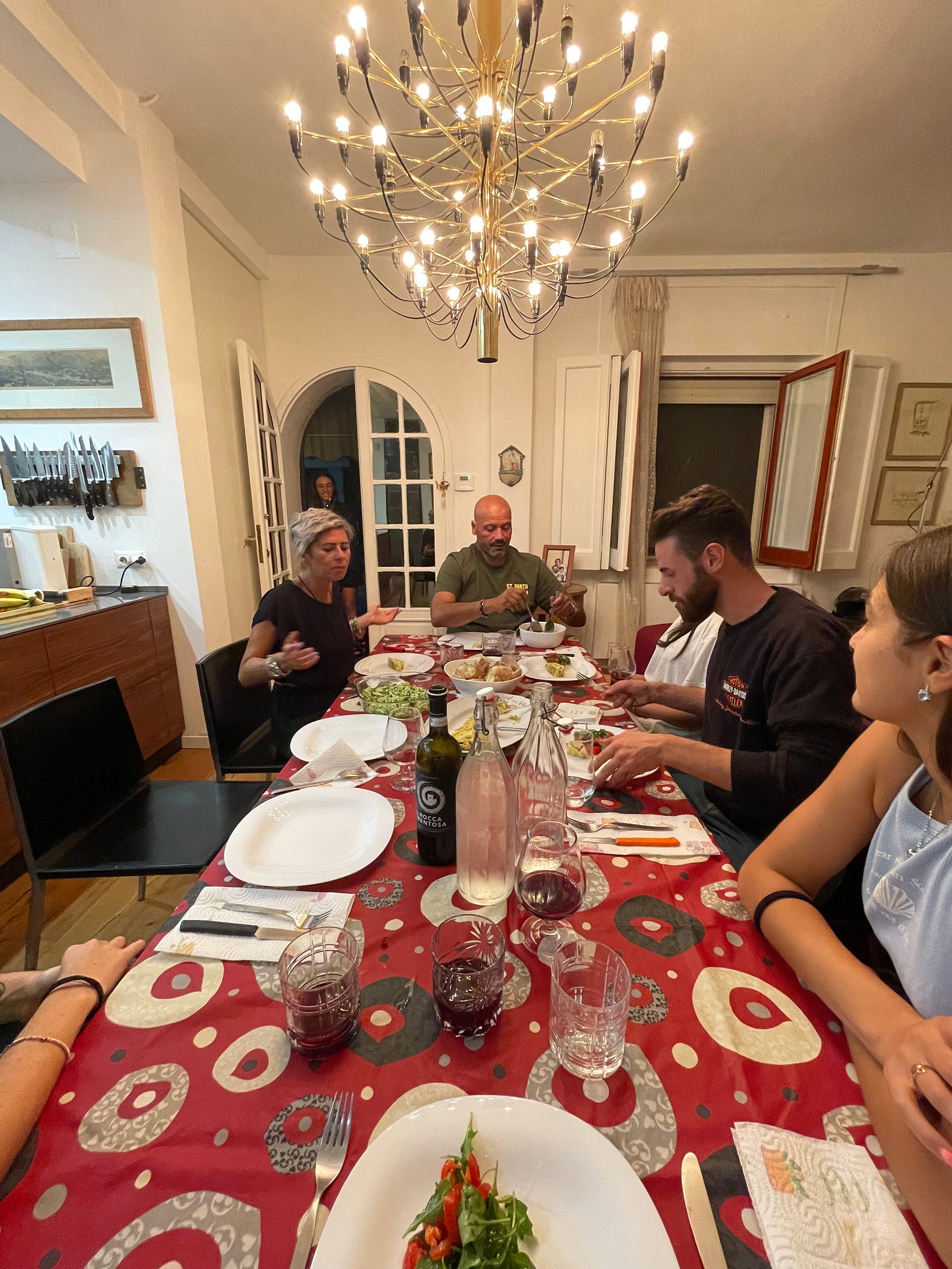Cooking as an Act of Solidarity
How a family in crisis resorted to the dinner table in their time of need
I’d always been aware that food is at the heart of the Italian family. This crumb of knowledge is so often written about and portrayed in TV and films that the sentiment itself has almost become trite. But one evening not long ago as I sat around the family dinner table of one of my closest friends here in Italy, I began to comprehend the notion more deeply and emotionally than ever before.
You don’t need to have visited Italy itself to know the importance of food and the long, rich history it occupies in their culture and their stomachs. In fact, a trip around most towns and cities in the UK reveals how we've imported some of the most famous components of Italian cuisine into the unfilled gap of our own culinary identity.
But how important can food actually be? Almost everyone loves food after all. It certainly doesn’t mean everyone here knows how to cook. I’ve had enough conversations with my students to know that not everyone is an enthusiastic and budding young chef.
So what then? How does any of this play out differently to the experience of cooking and sharing food in our own lives?
On one particular evening a few weeks ago, I was visiting my dear friend Pia and her family at a time of crisis. Her father, Gianfranco, had suffered a very serious pulmonary embolism. He was put into a medically induced coma for three days. In a small town, the news shook and affected many who knew the family. Every minute and hour that went by during the subsequent days was a seesaw of dread and hope.
Sat on Pia’s terrazza (a large balcony area) I caught up with her this particular night. I noted a cautious optimism in her tone. There was progress, yet various things hung in the balance. She was exhausted but buoyed by her latest trip to the hospital that day and wanted company. Not long after my arrival, another friend joined us. Soon we drifted into the kitchen and dining area, Pia and her mother providing us with the key updates.
It was an expectedly delicate atmosphere. Nothing was normal. The larger-than-life Gianfranco was absent, a void somewhere in the room. Words struggled to flow. Too much optimism would surely tempt fate. What is relevant to discuss then?
I changed my position. Sometimes I sat, sometimes I stood. Phones were checked and returned to the pocket. Glasses of water were anxiously sipped. Surfaces were wiped and objects rearranged. Very little needed doing, but everything was done. Much of the house was a scene untouched and the kitchen, usually the home's hearth, was merely an ornament.
More arrivals came to the house, making us a group of nine. Before long, without a word of discussion uttered, food began to appear from the fridge and cupboards. Pots and pans, plates and bowls all followed. Blink and you missed where they came from…but there they were, on the hob and on the table. Everyone simply drifted into various positions around the room to perform roles that needed no name nor instruction.
Simple dishes and small plates of food began to come together. Wine appeared and the popping of the cork seemed to banish the tension and bring instead smiles to our faces. With it all, I could see a sense of normality begin to appear amongst everyone.
This was what people knew how to do. People were no longer questioning themselves about how to act. Rather, they simply began to be, comfortable with these processes deeply engrained within the fibres of their being.
We were all well aware of Gianfranco’s health, that things weren’t normal and we didn’t pretend as such by having dinner together. But that evening every chop and slice, whisk and stir, each knife and fork placed on a table freshly draped, was a small contribution to one another in a time of need.
The mundane processes we undertake almost every day became a triumph of unison that evening. The instinct driving everyone’s actions was almost tangible and it was stirring to witness.
During the meal, I was warmed to the bone by the Italian affection for watching others fill their bellies. If there is one time humility and modesty are outright rejected it’s when you’re at the dinner table. Every time someone tried to deny an offer of more food they were met with “No stai zitto! Mangia mangia” (“No be quiet! Eat eat!”). Wine was poured into every glass that threatened to become half empty and bread mopped up every morsel of food that remained.
I came away from that experience deeply touched and grateful for what I had shared with these people. More than anything else, I had food to thank. It had facilitated a moment desperately needed by all of us, not least Pia and her family. A moment to finally take a deep breath and pause, to find genuine pleasure in life again if not just for a split second.
In essence, then, what crystalised in my mind that night? That food brings us together and allows us to perform small, selfless acts that contribute to a larger whole. These acts come to fruition in front of our eyes and we equally share in its treasures. Perhaps most pertinently, it can provide us the time to ask people we care about deeply how they are, or if words are hard to come by, simply to do something for them. All of this, not just at times of fortune and joy, but sometimes when we need each other most.







Beautiful words.